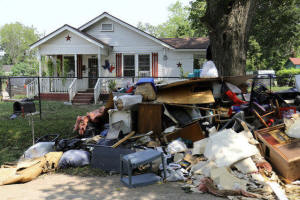|
Harvey-struck Texas
counties face blow to property tax revenues
 Send a link to a friend
Send a link to a friend
 [September 09, 2017]
By Laila Kearney [September 09, 2017]
By Laila Kearney
NEW YORK (Reuters) - Texas communities
flooded by Hurricane Harvey could see their property tax revenues sink,
a financial blow that would leave many cities and counties struggling
for years.
Property taxes are the top source of revenue for local governments in
Texas, which depend on it to fund schools, roads and other public
services.
With tens of thousands of homes and businesses damaged, officials
foresee tumbling values when those structures are reassessed.
"This is something that is going to depress revenues, the only major
revenues our counties have, immediately and for years," said Donald Lee,
executive director of the Texas Conference of Urban Counties, a
non-profit organization of 37 member counties.
Texas is one of seven states nationwide that has no state income tax,
leaving it with an outsized dependence on property taxes. The Lone Star
state has the third highest average property tax rate in the United
States, at 2.06 percent, according to a study by real-estate tracker
ATTOM Data Solutions.

Neighboring Florida, which likewise has no state income tax, could face
a similar challenge. The state is bracing for a direct hit from
Hurricane Irma, one of the strongest storms ever recorded in the
Atlantic. Florida counties like Miami-Dade, which is in Irma's immediate
path, also count property taxes as their biggest revenue source.
Wind and flooding damaged at least $65 billion worth of property since
Hurricane Harvey made landfall on Aug. 25 and tore across dozens of
Texas counties in the following days, according to a preliminary report
by AIR Worldwide, which evaluates the impact of catastrophes.
Assessors in Harris County, home to Houston, began visiting
neighborhoods struck by Harvey this week, according to Harris County
Appraisal District spokesman Jack Barnett.
But with roughly 1.8 million parcels of property in the county, where
property taxes poured more than $1.4 billion into county coffers last
year, the impact to property values was largely unknown.
Harris County Treasurer Orlando Sanchez echoed the sentiment. "There
will be a hit, there's no question about it, but we'll have to see what
that is," Sanchez said.
Still, analysts and local officials suspect Harvey could wallop property
tax revenues to a degree few storms have in the United States.
"The flooding that we're seeing reminds me a lot of (Hurricane)
Katrina," which devastated New Orleans in 2005, said Kate Boatright, a
Dallas-based analyst with S&P Global Ratings.
Property tax collections in New Orleans dropped 17 percent after the
storm, and did not recover to pre-Katrina levels until five years later,
according to the city's financial reports.

Thousands of New Orleans workers and teachers were laid off while major
streets lay broken for years. S&P downgraded the city's credit.
[to top of second column] |

Flood damage from a home is left along the street in the aftermath
of tropical storm Harvey in Wharton, Texas, U.S., September 6, 2017.
REUTERS/Mike Blake/File Photo

In Texas, certain Harvey-struck counties, like Harris, are starting from a
stronger financial position than that of New Orleans and Louisiana when Katrina
bore down, which could help with recovery, Boatright said.
Harvey, which brought a record 51.88 inches of rain to southeast Texas, also
flooded large swaths of residential and commercial property.
By Friday, Texas counties and cities had reported at least 68,981 homes and
businesses were destroyed or severely damaged in the storm, with another 145,944
properties affected in some way, the Texas Department of Public Safety said.
Many were outside of designated flood plains.
Properties beyond mapped flooding areas typically are not required to have flood
insurance, and the cost of rebuilding or repairing can fall on property owners.
"A lot of property owners do not have the money sitting around to rebuild," said
Lee of the Texas counties organization.
As a way to mitigate the costs, owners will look for emergency reassessments of
their homes to reduce their upcoming tax bills, he said.
Each county in Texas has an appraisal and collection system. Values are usually
set in January and bills go out in October and November.
Even if property owners don't get reappraisals, revenues will still likely sink
if the homes are not restored to pre-storm conditions by the next annual
appraisals, Lee said.

The potential drop in revenue comes amid a state legislative fight over property
taxes, which many Texas residents say have become unaffordable. Republican
Governor Greg Abbott has supported an effort to make it harder for large
counties and cities to raise property taxes. But that measure stalled in a
special legislative session last month.
Texas-based Fitch Ratings analyst Steve Murray said he was concerned about the
impact on smaller Texas localities, which typically have lower financial
reserves to sustain them than do larger cities and counties.
The speed at which communities recover and grow back their tax bases will also
depend on the timeliness and amount of federal aid, Murray said.
But that money can take months, and often years, to reach damaged communities
after disasters.
"In the meantime, revenue is going to take a hit," Lee said.
(Reporting by Laila Kearney; Additional reporting by Karen Pierog; Editing by
Megan Davies and Marla Dickerson)
[© 2017 Thomson Reuters. All rights
reserved.] Copyright 2017 Reuters. All rights reserved. This material may not be published,
broadcast, rewritten or redistributed. |